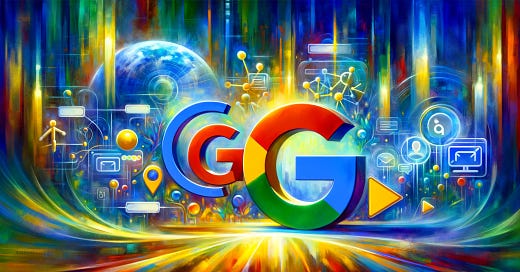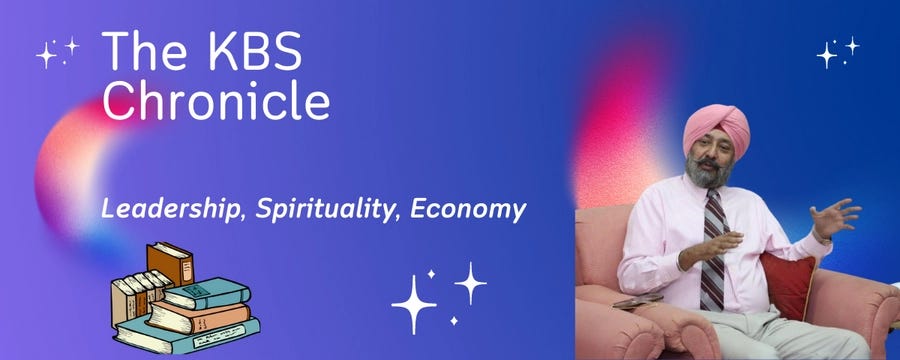"A Brief History of Search" and the Innovator's Dilemma
End of history with "search" on Google? "Look no further", or "thou findest what thou seekest"?
Introduction: The Evolution of “Search”
In the digital age, “search” is our interface to both the real and virtual worlds. Whether it's a traditional Google search or navigating to a destination using Google Maps, search engines have become an integral part of our daily lives. For a long time, Google enjoyed a virtual monopoly in this space, with competition being quite peripheral. However, the advent of OpenAI's ChatGPT-4 and, more recently, ChatGPT-4.0, has forced Google to accelerate from its leisurely pace, heralding a new era in the search landscape.
This piece, adapted from the original article titled “A Brief History of Search” by Bilawal Sidhu, the honorary Tech Adviser of "The KBS Chronicle" based in Austin, Texas, USA, effectively and succinctly traces the evolution of search in the digital age.
The Rise of “Search”
The internet is vast and ever-changing, resembling a world wide web, literally as well as metaphorically. In its early days, finding the right information was challenging, requiring users to know the exact websites and their trustworthiness. Search engines solved this problem by scraping every website to create a searchable index, enabling users to query it with simple keywords. Google perfected this technology with its "PageRank" algorithm, effectively making it the homepage of the internet where people went to find anything and everything.
Google's Monetization and Market Dominance
As Google became the go-to platform for finding websites and content, a clever business model emerged. Advertisers competed for ranked placements on the first page, leading to the creation of Google AdSense. This transformed Google into a money-printing machine, benefiting websites, advertisers, and consumers alike. Google's ability to constantly update its index in near real-time created a formidable moat, making it challenging for competitors like Microsoft to keep up.
The Decline in User Experience
Despite its success, over time, Google's search became bloated with ads and low-quality SEO content. Many users found useful answers in YouTube videos, which didn’t concern the Mountain View behemoth since Google owned it. However, the overall decline in user experience happened gradually, making it less discernible. Visual distinctions between sponsored and organic results became blurred, and the search results were littered with subpar content. Despite this, Google's significant moat kept it ahead of any competition, with even Apple preferring to keep Google as the default search engine on iOS, albeit for a substantial annual fee.
The Innovator's Dilemma: From Search Engines to Answer Engines
The recent emergence of Large Language Models (LLMs) like ChatGPT and Claude marked a significant shift from traditional search engines to answer engines. These models, trained on vast amounts of internet text, could answer queries in natural language, offering a more intuitive user experience. Unlike Google, which provided a list of links, ChatGPT delivered direct answers, revolutionizing how people searched for information.
A Sleeping Giant Awakes
ChatGPT's intuitive interface and ability to provide direct answers quickly gained popularity, prompting Google to respond. This led to the launch of Google Bard and the subsequent development of Gemini, aimed at closing the gap with OpenAI. The shift in user behaviour was evident, with many preferring ChatGPT for certain types of queries, significantly challenging Google's dominance.
The Challenges and Opportunities of LLMs
While LLMs offer significant advantages, they come with their own set of challenges. One major issue is the lack of citations, leading to legal battles like the NYT lawsuit against OpenAI. However, solutions like Perplexity and Microsoft Copilot offer a middle ground, combining real-time search with summarized results and proper citations. This hybrid approach enhances user experience and maintains the integrity of source material.
The Future of Search: Business Models and Publisher Dynamics
The rise of AI-powered search engines raises questions about future business models. Some of the current AI applications charge a subscription fee, but the sustainability of this model is uncertain. Google faces the challenge of integrating generative AI into its search results without undermining its lucrative ad revenue model. The future might see a blend of advertiser-funded models and innovative monetization strategies.
Impact on Publishers and Content Creation
As AI models exhaust the existing internet text, the need for new human-generated content becomes critical. Publishers must adapt to this changing landscape, using AI tools to enhance content creation and maintain relevance. Procedurally generated content, personalized newsfeeds, and AI-augmented newsletters are just a few possibilities that could reshape the content industry.
Looking Ahead: A Human-Centric Future
The race for dominance in the search engine market is on, with AI at the forefront. While AI offers exciting possibilities, it is crucial to remember that the end-user is always a human being. We must retain our critical thinking skills, moral compass, and value system to override or reject AI-generated recommendations. As we move forward, the focus should remain on leveraging AI to enhance human experience rather than replace human judgment.
In this dynamic landscape, the battle for search supremacy continues, but the ultimate winner will be the one that best serves human needs and values.





